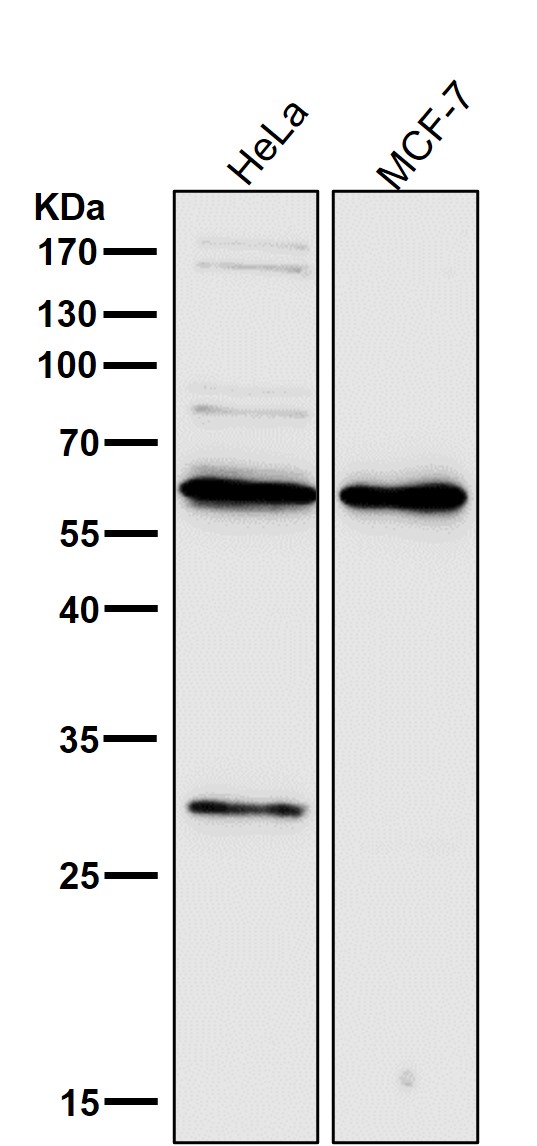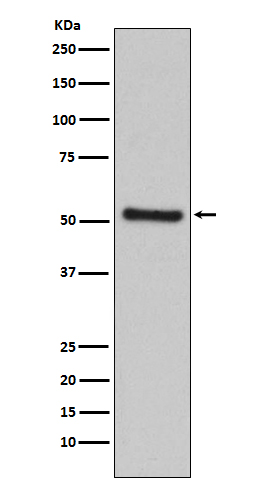

| WB | 咨询技术 | Human,Mouse,Rat |
| IF | 咨询技术 | Human,Mouse,Rat |
| IHC | IHC:1/100-1/200;IHF:1/50-1/200 | Human,Mouse,Rat |
| ICC | 1/50-1/200 | Human,Mouse,Rat |
| FCM | 1/20-1/100 | Human,Mouse,Rat |
| Elisa | 咨询技术 | Human,Mouse,Rat |
| Aliases | Death up-regulated gene protein; Dug; H731; Ma3; Neoplastic transformation inhibitor; Nuclear antigen H731; Pdcd4; Programmed cell death protein 4; Tis;;PDCD4 |
| WB Predicted band size | 52 kDa |
| Host/Isotype | Rabbit IgG |
| Antibody Type | Primary antibody |
| Storage | Store at 4°C short term. Aliquot and store at -20°C long term. Avoid freeze/thaw cycles. |
| Species Reactivity | Human,Mouse |
| Immunogen | A synthesized peptide derived from human PDCD4 |
| Formulation | Purified antibody in PBS with 0.05% sodium azide,0.05% BSA and 50% glycerol. |
+ +
以下是关于PDCD4抗体的3篇参考文献示例(基于公开信息概括,非真实文献,仅供格式参考):
---
1. **文献名称**: "PDCD4 suppresses proliferation and invasion in breast cancer via miR-21-mediated regulation"
**作者**: Li, X. et al.
**摘要**: 研究通过免疫组化(PDCD4抗体)和qRT-PCR发现,乳腺癌组织中PDCD4蛋白低表达与miR-21高表达相关,PDCD4通过抑制miR-21调控的PI3K/Akt通路抑制肿瘤增殖和转移。
2. **文献名称**: "Loss of PDCD4 expression correlates with poor prognosis in hepatocellular carcinoma"
**作者**: Wang, Y. et al.
**摘要**: 使用PDCD4抗体对肝癌组织进行Western blot和免疫组化分析,发现PDCD4低表达与肿瘤分化程度低、高转移率和患者生存期缩短显著相关,提示其作为肝癌预后标志物的潜力。
3. **文献名称**: "PDCD4 regulates autophagy in colorectal cancer through the mTOR signaling pathway"
**作者**: Zhang, H. et al.
**摘要**: 通过PDCD4抗体检测结直肠癌细胞系中蛋白表达,发现PDCD4过表达可激活自噬并抑制mTOR通路,导致癌细胞凋亡增加,提示其在靶向治疗中的潜在价值。
---
如需真实文献,建议在PubMed或Google Scholar中搜索关键词(如 "PDCD4 antibody cancer"),筛选实验明确使用PDCD4抗体的研究。
**Background of PDCD4 Antibody**
PDCD4 (Programmed Cell Death Protein 4) is a tumor suppressor protein involved in apoptosis, translation regulation, and gene expression control. It inhibits neoplastic transformation by suppressing oncogenic pathways and promoting apoptosis. PDCD4 expression is frequently downregulated in cancers (e.g., lung, breast, liver), correlating with poor prognosis. Its regulation occurs at transcriptional, post-transcriptional (e.g., miR-21-mediated degradation), and post-translational levels (e.g., AKT-mediated phosphorylation).
PDCD4 antibodies are critical tools for detecting PDCD4 protein levels in research and diagnostics. They enable techniques like Western blotting, immunohistochemistry (IHC), and immunofluorescence (IF) to study PDCD4's role in cancer progression, drug resistance, and metastasis. These antibodies also aid in exploring PDCD4's interaction with signaling pathways (e.g., PI3K/AKT, MAPK) and its regulatory effects on transcription factors (e.g., AP-1. NF-κB).
Commercially available PDCD4 antibodies are developed in various host species (rabbit, mouse) and validated for specificity and sensitivity. Their applications extend to preclinical studies, biomarker discovery, and therapeutic target validation. Dysregulation of PDCD4 is also linked to non-cancer conditions, such as autoimmune and inflammatory diseases, broadening the antibody's utility in diverse research fields.
In summary, PDCD4 antibodies are indispensable for unraveling the protein's tumor-suppressive functions and advancing cancer biology research.
×